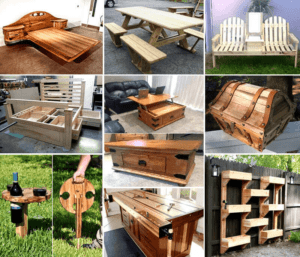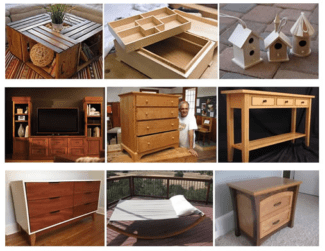A wide range of abilities, specialties, and applications are included in woodworking. Some novices take on too much too soon or spend their hard-earned money on pricey equipment and products that they don’t know how to operate and may never utilise. Furthermore, even some simple strategies might be challenging or simple to use incorrectly. Expert woodworkers can give you some straightforward but useful advice to get you off to a good start.
Conduct research
The initiative, bravery, and a spirit of adventure are all positive traits, and many accomplished woodworkers developed their abilities just stepping in and attempting to construct something. Whatever they decided to do for their first project probably turned out better than they anticipated, albeit probably not nice enough to use or show. Even those courageous individuals who start from scratch without any planning frequently find that they need to consult some books, magazines, or skilled woodworkers to learn how to do it correctly.
The woodworkers emphasize that learning about the many parts of woodworking before beginning a first project can help a person save time and frustration. Many others advised finding some decent books or periodicals at the bookstore or library for free. Learn the fundamentals first, such as different styles of woodworking, different types of trees and woods and how they are used, different tools, etc. – information similar to that which is provided in this article.
Paul Johnson, a lifelong woodworker, revealed, “I have one entire section of my garage loaded with books and publications.” I keep the ones I subscribe to that feature projects or approaches I’d like to try. I also purchase a few new novels each year. Whenever I came across one that was suggested or contained information I was interested in learning, I would buy books left and right when I first started woodworking. They aid in providing me with project ideas, he continued. I particularly enjoy them with patterns.
You should have a general concept of the type of woodworking that interests you after learning the fundamentals, at which point you can go on to books or even workshops that teach practical skills in that field.
Take a Few Courses
In fact, many of our experts suggested taking lessons. It will usually provide you with a decent understanding of various tools and woodworking safety, whether it’s a beginner’s class through the nearcommunity college or something taught an experienced woodworker. Some lumberyards and building supply stores also provide seminars on the fundamentals or show you how to make a specific project.
If you don’t like taking classes but know someone who is good at woodworking, ask them if you can help them out with a project or just sit and watch. Most woodworkers enjoy discussing their craft and showing it to others. They might gladly comply if asked.
Simple is best.
When people were asked for advice for beginning woodworkers, the response “Keep it simple” repeatedly came up. Start with straightforward tasks, ideally those that only require hand tools. You will gain knowledge about how to perform crucial tasks like measuring, cutting, shaping, and joining. It is crucial to master those fundamental skills.
Start using a precut kit if you are completely new to woodworking and haven’t used tools all that much previously. Wood that has already been cut into the proper shapes and sizes makes up the majority of kits. You must adhere to the instructions and assemble the parts. These kits frequently need to be screwed, glued, sanded and finished. To get you started, you can create birdhouses and feeders, seats, plant holders, and many other enjoyable things.
Don’t worry about designing and sizing your own lumber until you’re comfortable and confident, even as you go on to more complicated tasks. Lumber that has been prepared and cut to a variety of widths is readily available. Additionally, pre-made table legs, chair spindles, and other turned parts are easily accessible. Over time, introduce some of those more challenging projects gradually, making each one more challenging.
Tool Advice
The advice to keep things straightforward is also applied to woodworking tools. The majority of those consulted advised purchasing tools as needed and expanding your collection as needed for new projects. The list of tools required is provided if a project is bought as a kit or with printed instructions. You will normally require hammers, a tape measure, clamps, a square, saws, hand drills, and a set of chisels, depending on the kind of projects you decide to start with.
A competent table saw should be purchased early on, according to some woodworkers, but only if you plan to complete tasks that require numerous cuts, particularly ones that require various angles. Most novice jobs can be completed with a handsaw or possibly a circular saw.
It is strongly advised that you start off investing in good tools, but hold off on purchasing top-of-the-line equipment until you are convinced that you want to remain with woodworking. If it turns out that you’ll continue to be interested in this, you might want to think about investing in the highest-quality instruments you can manage. You must conduct a study because the highest quality doesn’t always equate to the most expensive.
Spending as much as you could afford on fundamental tools like hammers, saws, screwdrivers, drills, and bits is advised experts. Even if you don’t pursue woodworking, you’ll need this equipment around the house. These tools will last you a lifetime if you spend the money upfront and take proper care of them because you bought quality to start with.
Consider buying tools from an estate sale, auction, or garage sale if money is tight. However, if they are good tools and in general sound, you can clean and fix them for less money than it would cost to buy new ones. Some may have worn handles or appear to be rusty or dusty.
With woodworking tools, in general, you get what you pay for, but occasionally you pay for the brand name or features that you might not utilise in your specific sort of woodworking.
To understand more about various tool types and brands, you will once more need to consult books, publications, websites, and other woodworkers. There is a lot to learn, and it is a continuous process, as was already mentioned. However, it is simple to conduct your own study because of the abundance of material available on various elements of woodworking as well as the numerous websites and Internet resources.



